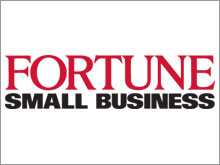|
Beating the high cost of healthcare
A new start-up helps cash-strapped small businesses pick a doctor, hospital or medical plan.
NEW YORK (FORTUNE Small Business) - A company called Subimo -- which is itself a startup -- offers the kind of services that may soon become critical to other small businesses trying to cut healthcare costs. The five-year-old, 25-employee company from Chicago offers an easy-to-navigate database of health information designed to help patients find and compare doctors and hospitals. Subimo, and outfits like it, provide much-needed information to employees at companies shifting to consumer-driven healthcare plans.
Indeed, the thousands of businesses that signed up for some form of consumer-driven health care last year may have helped make CDH the hottest medical acronym since HMO. But they've tended to overlook one major obstacle. Although the plans aim to encourage smarter health-care spending by placing more responsibility on the employee -- in the form of higher deductibles and personal accounts -- they tend not to provide information to help patients make those decisions. "You can still find more information on buying a used car online than you can about a physician or hospital," says Ann Mond Johnson, Subimo's president. That insight led Johnson to form Subimo -- a loose acronym for "So you'll be informed more often" -- in 2000. Subimo's technicians compile reams of disparate data from private research firms and public sources like state health-care agencies. They then embellish that information with a simple navigation tool and sell the finished product to health insurance firms such as Harvard Pilgrim and Oxford, as well as to large and small employers. And this fall, Johnson and her team are targeting individual customers with the launch of myhealthcareadvisor.com, a Web site that charges $12 for six months' access. "For our money they are the best database and decision tool out there," says Subimo client Michael Parkinson, chief health and medical officer of Lumenos, based in Alexandria, Va., which provides consumer-driven health plans in all 50 states. Rick Morrone, the director of national sales and marketing for Blue Cross Blue Shield of Michigan, signed his company up as a Subimo client after he used it to research where his 69 year-old father should go to have a quadruple bypass. "When you or someone you love is slated for surgery, the last thing you want to do is struggle to find information," says Morrone. Johnson, 49, and her three co-founders financed the company with their personal credit cards and about $900,000 from friends and family. So it's not surprising to hear of Subimo's frugal spending philosophy: "Kiss every penny you spend and tell it to come home soon." Subimo employees work from home, and meetings are usually held via teleconference or instant message. So far the company's modest approach has yielded only modest results: Although Subimo reaches 60 million customers, last year's revenues barely hit $10 million. The company did turn a profit, but considering that consumer-driven health care is estimated to be a $16 billion industry, Subimo may seem to be underperforming. Johnson argues that her corner of the billion-dollar consumer-driven health market is still young. "We're profitable and we're growing steadily," she says. "I'm fine with that." But Subimo will soon face formidable competitors. In March, WebMD, a $1-billion-a-year online company that provides everything from billing services to medical research data, paid $31 million for HealthShare Technology, a company with a hospital-comparison tool similar to Subimo's. WebMD intends to use the purchase as the backbone for WebMD Health, a consumer site that will compete with myhealthcareadvisor.com and may go public next year. Then there's Steve Case's Revolution. Founded in April, the new company has an online endeavor that Case says will "put consumers back at the center of the system by giving them more choice, control and convenience -- while building the first comprehensive, consumer-driven health-care company." Case, the founder of AOL (owned by Time Warner, the parent of FSB's publisher and CNN/Money), is fronting $500 million of his money and has won additional investments from celebrity CEOs and from Colin Powell. Johnson shrugs off the threats: "Do you really think Steve Case and Colin Powell can fix health care?" But Johnson will need more than a dismissive attitude, says Forrester Research analyst Katy Henrickson. "This is an increasingly crowded niche," she says. "You can't ignore larger and better-funded rivals." Johnson insists that while her rival is busy filing reams of documents with the SEC, Subimo is acquiring databases so it can provide more complete information on doctors and hospitals. For Blue Cross Blue Shield of Michigan's Rick Morrone, choosing Subimo was a no-brainer, and he is now gladly recommending Subimo to other Blue Cross plans around the country. If Johnson's going to beat back her rivals, she'll need a few more referrals like that. To read the full article in FSB, click here. More from FORTUNE Small Business:
|
| ||||||||||||||||||


